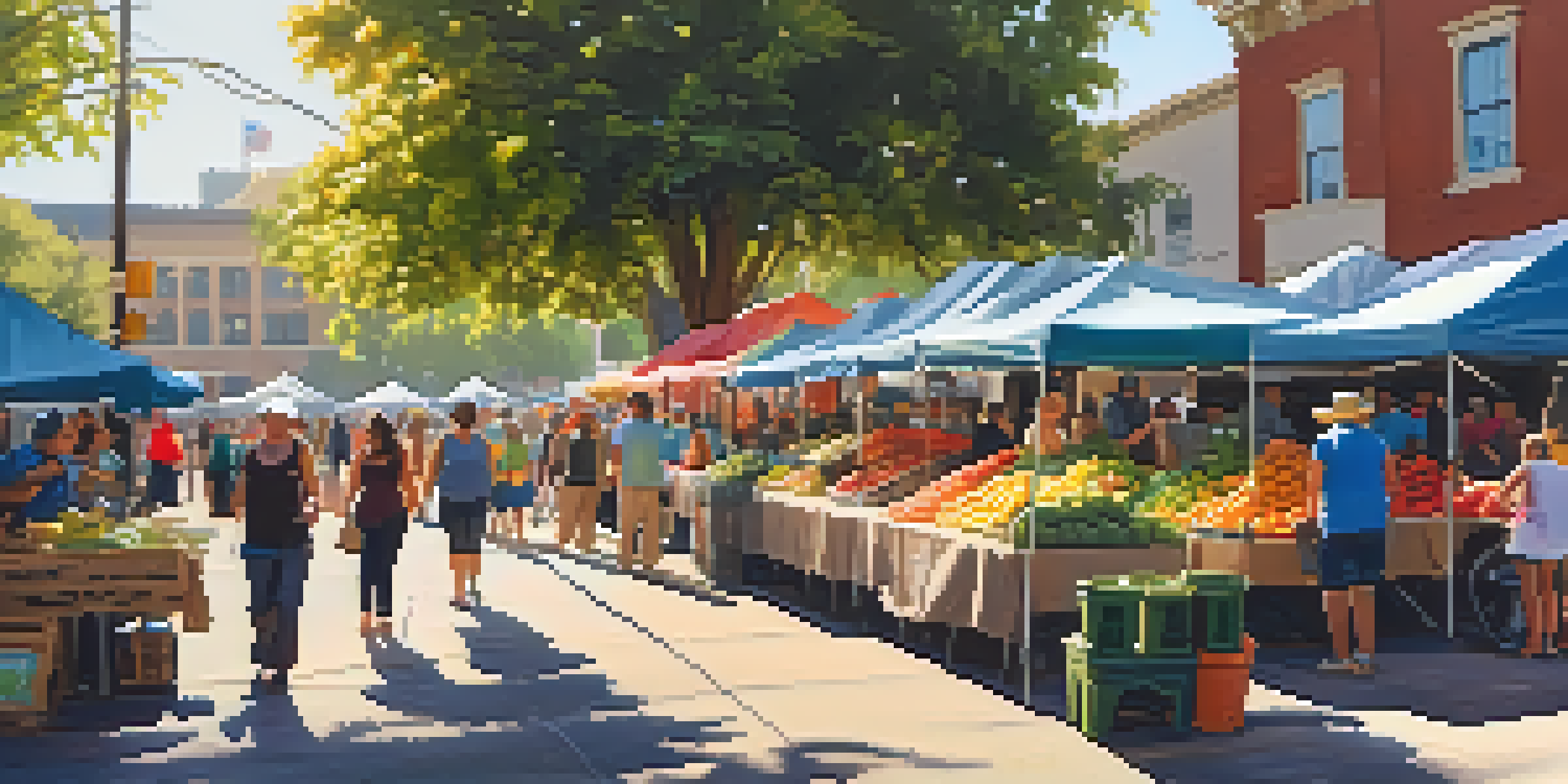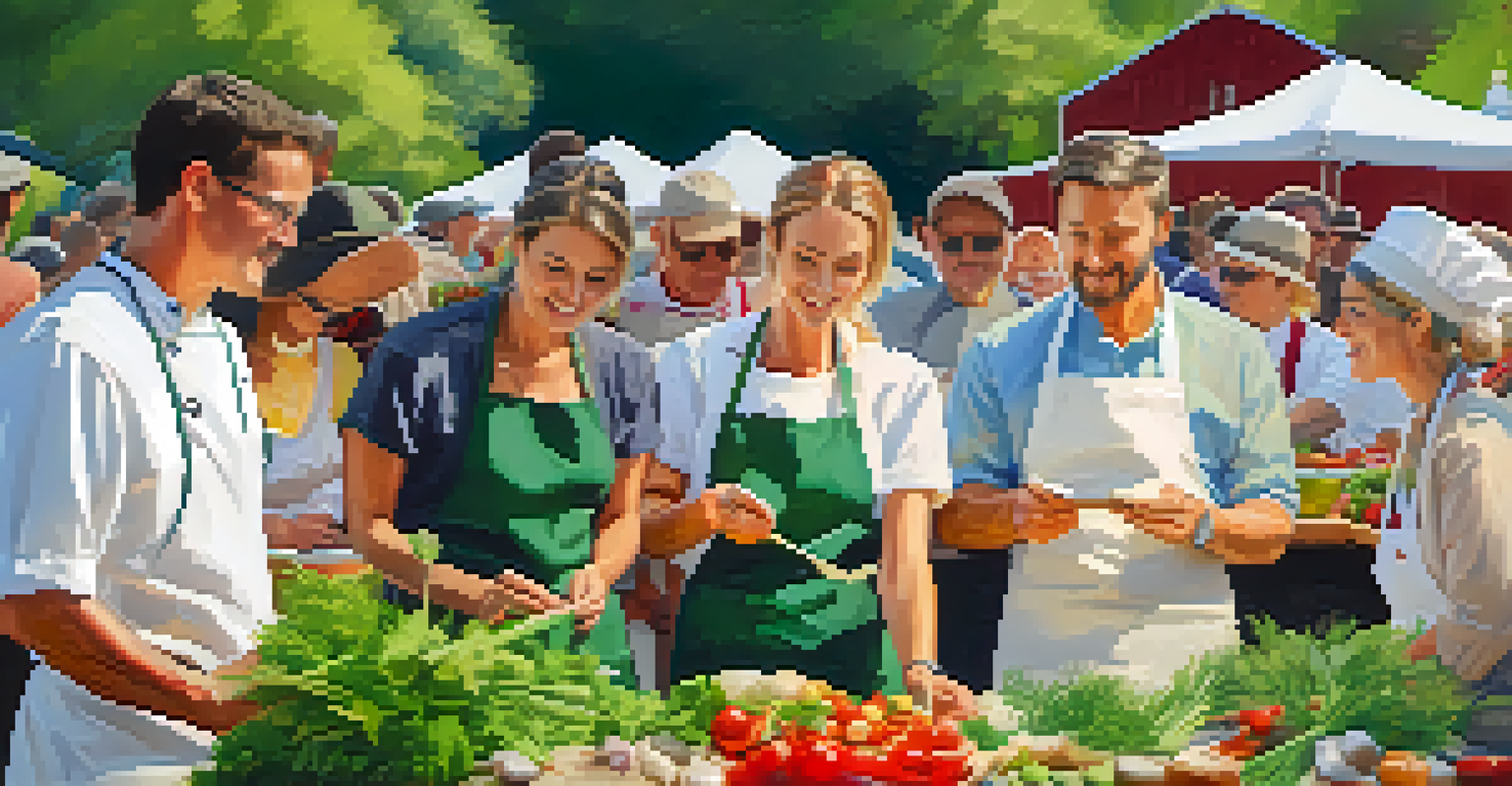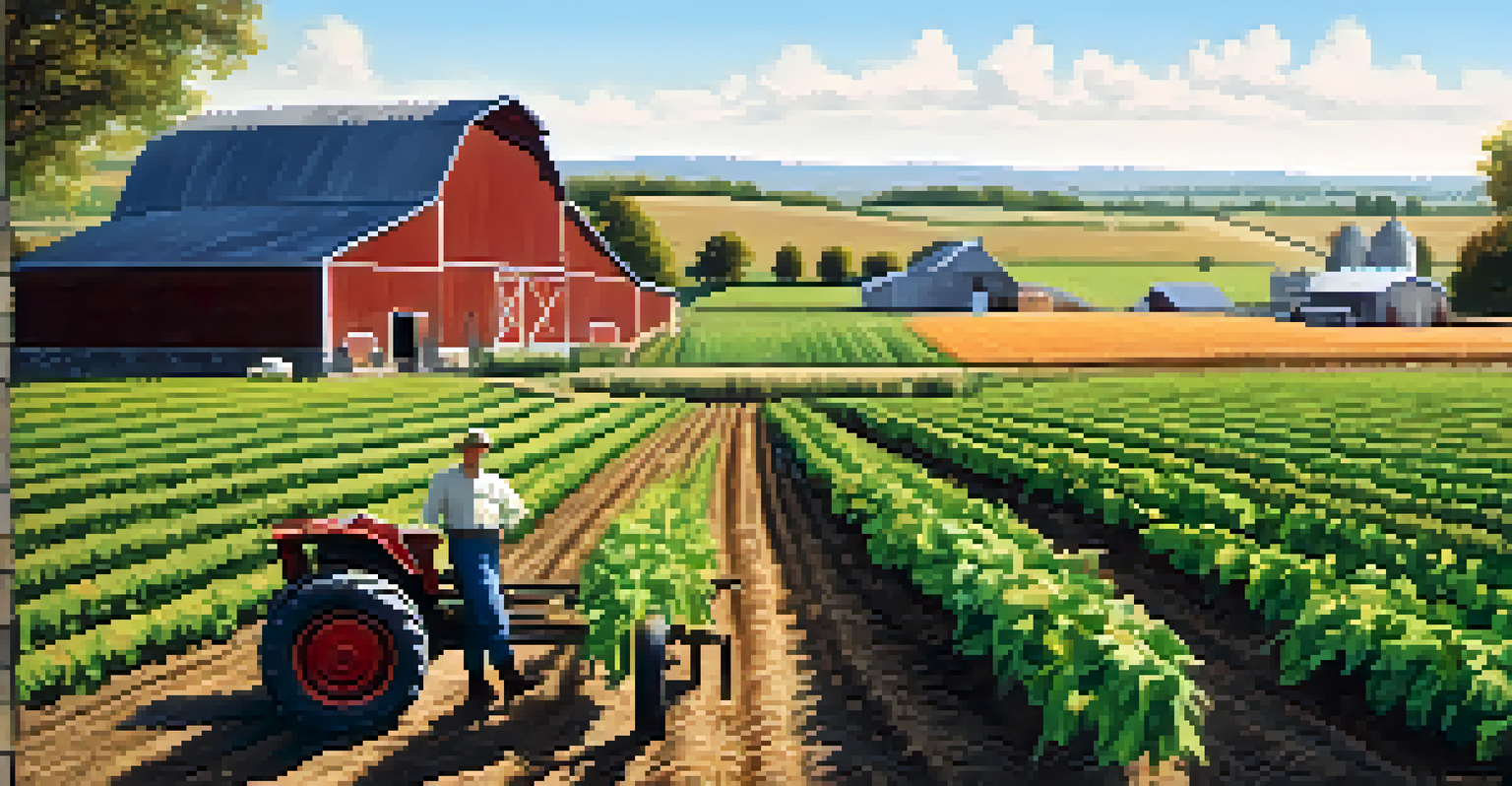The History of Sacramento's Annual Farm-to-Fork Festival

The Origins of the Farm-to-Fork Movement
The Farm-to-Fork movement began as a response to the growing demand for locally sourced food. It emphasizes the connection between farmers and consumers, encouraging people to know where their food comes from. In the early 2000s, Sacramento emerged as a leader in this movement, thanks to its rich agricultural landscape and commitment to sustainability.
Eating local food is not just about taste; it's about connecting with the community and the land.
Local chefs and food advocates started promoting the idea of eating seasonally and supporting nearby farms. This shift not only benefited the community but also helped reduce the carbon footprint associated with transporting food over long distances. As farmers markets gained popularity, the vision for a larger celebration of this local bounty began to take shape.
In 2013, Sacramento officially launched its first Farm-to-Fork Festival, showcasing the region's vibrant food scene. This festival aimed to connect consumers with local producers, celebrating the area's agricultural heritage while promoting healthy eating habits. It marked a pivotal moment in the city's culinary history.
Key Milestones in the Festival's Evolution
Since its inception, the Farm-to-Fork Festival has grown significantly, both in size and scope. The first festival attracted a few thousand visitors, but it quickly became a staple in Sacramento's annual calendar. By embracing local chefs, farmers, and artisans, the festival has transformed into a vibrant showcase of the region's culinary talent.

Each year, new events and activities are introduced, ranging from cooking demonstrations to farm tours. The festival not only highlights the incredible flavors of Sacramento but also educates attendees about sustainable practices and the importance of supporting local agriculture. This evolution has kept the festival fresh and engaging for returning visitors.
Celebrating Local Food and Farmers
The Farm-to-Fork movement connects consumers with local farmers, emphasizing the importance of sourcing food sustainably.
As the festival expanded, it started attracting national attention, drawing food lovers and media from across the country. This recognition has helped Sacramento establish itself as a culinary destination, further fueling the local economy and fostering a sense of community pride.
The Role of Local Farmers and Artisans
Local farmers and artisans are the backbone of the Farm-to-Fork Festival, providing the fresh ingredients and unique products that define the event. Their dedication to sustainable practices ensures that the food served is not only delicious but also environmentally friendly. By participating in the festival, these producers gain invaluable exposure and connect directly with consumers.
When we support local farmers, we invest in our community and the health of our planet.
The festival creates an opportunity for farmers to share their stories, educating attendees about the hard work and passion that goes into producing food. This personal connection fosters a deeper appreciation for the food we eat and encourages people to support local businesses. Many visitors return to the festival year after year, eager to discover new products and reconnect with their favorite vendors.
Moreover, the festival champions the idea of community-supported agriculture (CSA), where consumers can subscribe to receive fresh produce directly from local farms. This model not only strengthens local economies but also promotes healthier eating habits by providing access to seasonal fruits and vegetables.
Engaging Culinary Events and Activities
One of the highlights of the Farm-to-Fork Festival is its diverse array of culinary events that cater to all tastes. From cooking demonstrations by renowned chefs to hands-on workshops, there's something for everyone. These interactive experiences allow attendees to learn new skills while appreciating the art of cooking with fresh, local ingredients.
Additionally, the festival features a wide variety of tastings and food pairings, showcasing the unique flavors of Sacramento. Attendees can sample dishes from local restaurants and food trucks, as well as artisanal products like cheeses, breads, and preserves. This culinary journey not only tantalizes the taste buds but also highlights the creativity of local chefs and food artisans.
Festival Sparks Culinary Innovation
The Farm-to-Fork Festival has transformed Sacramento into a culinary hub, inspiring chefs to prioritize local ingredients in their menus.
The festival also includes family-friendly activities, such as kids' cooking classes and farm tours, making it a fun outing for all ages. These engaging experiences foster a sense of community and encourage families to explore the importance of food sourcing and sustainable practices together.
The Impact on Sacramento's Culinary Scene
The Farm-to-Fork Festival has had a profound impact on Sacramento's culinary landscape, positioning the city as a hub for food innovation. Local chefs have embraced the farm-to-table philosophy, creating menus that reflect the seasonal bounty of the region. This shift has not only elevated the dining experience but also inspired a new generation of chefs to prioritize local ingredients.
Restaurants across the city have started collaborating with local farms, establishing direct relationships that benefit both parties. These partnerships ensure that chefs have access to the freshest produce, while farmers gain a steady market for their goods. As a result, Sacramento's food scene continues to flourish, with new eateries opening that celebrate the farm-to-fork ethos.
Moreover, the festival has encouraged culinary tourism, attracting visitors eager to experience the unique flavors of Sacramento. This influx of food lovers has boosted the local economy and helped position the city as a culinary destination, further enhancing its reputation on a national scale.
Community Involvement and Volunteer Efforts
Community involvement is a cornerstone of the Farm-to-Fork Festival, with numerous volunteers playing a vital role in its success. From coordinating events to assisting vendors, volunteers help create a welcoming atmosphere for attendees. This spirit of collaboration is a testament to the strong sense of community that the festival fosters.
Local organizations and schools often participate by engaging students in food education initiatives. These programs promote healthy eating habits and raise awareness about the importance of supporting local agriculture. By involving younger generations, the festival encourages a lasting appreciation for the farm-to-fork movement.
Community Engagement Drives Success
Volunteers and local organizations play a vital role in the festival, fostering community spirit and promoting healthy eating habits.
The festival also highlights the power of community partnerships, bringing together businesses, non-profits, and local government to promote sustainable practices. This collective effort has reinforced the idea that everyone can contribute to a healthier food system, making the festival a true celebration of community spirit.
Looking Ahead: The Future of the Festival
As the Farm-to-Fork Festival continues to grow, its future promises exciting developments and new initiatives. Organizers are constantly exploring ways to enhance the festival experience, from incorporating more interactive elements to expanding the range of culinary offerings. This focus on innovation ensures that the festival remains relevant and appealing to both locals and visitors alike.
Moreover, the festival aims to place an even greater emphasis on sustainability and environmental responsibility. By highlighting eco-friendly practices and encouraging attendees to make mindful choices, the festival seeks to inspire a movement that extends beyond the event itself. This dedication to sustainability aligns with the broader goals of the farm-to-fork movement.

Ultimately, the Farm-to-Fork Festival serves as a reminder of the vital connection between food, community, and the environment. As it continues to evolve, it will undoubtedly play a crucial role in shaping the future of Sacramento's culinary landscape for years to come.